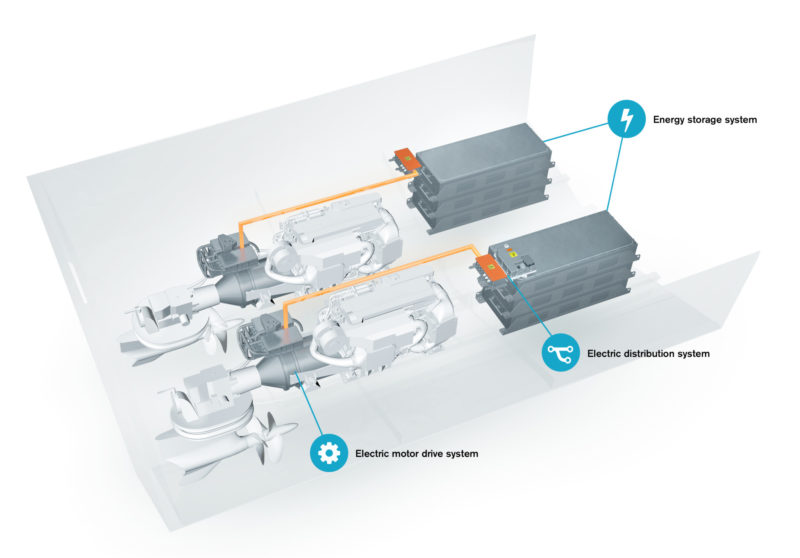A new hybrid electric drive system under development by Volvo Penta will enable zero-emissions running for commercial marine vessels and be available by 2021, the company said Wednesday.
Designed for Volvo Penta’s Inboard Performance System (IPS) propulsion, the hybrid variant will allow vessels to operate in designated low- and zero-emission areas, expected to become a common environmental management policy in coming years.
Lawmakers in Norway are already acting to reduce emissions from cruise ships and ferries in the nation’s fjords, where all-electric ferries are already in use. By 2026 only electric propulsion will be allowed in those zero-emission zones.
The hybrid option will also afford operators advantages of lower noise and vibration, and reduced operating costs, the company says. The hybrid IPS will be planned initially for matching with diesels in the 8- to 13-liter displacement range, suitable for ferries, pilot and supply boats and yachts.
“A hybrid provides a flexible solution, one that maintains the high efficiency offered by the IPS system and adds the ability to run in zero emission environments,” said Niklas Thulin, Volvo Penta’s Director of Electromobility.
“With full torque from the electric motor available instantly, the boat will maintain the responsiveness and controllability that IPS is famous for in electric-only mode, as well as offering the ability to run at 10 to 12 knots.”
A clutch and electric motor are added between the engine and the IPS pod. The electric motor is supported by scalable (depending on application needs) Li-ion battery packs that can be charged externally using AC or DC chargers; or recharged using the primary diesel engine.
Opening of the clutch allows the boat to run in electric-only mode, and with the clutch closed both diesel and electric power can be used in parallel. In terms of operation, the captain will use the familiar control interfaces of the IPS system, with the addition of new drive modes to choose from.
The modular nature of the battery packs allows customers to tailor the design and performance of both commercial and leisure boats. More battery capacity offers extended electric-only cruising, and – with frequent external charging – the use of smaller diesel engines and lower fuel costs.
With the electric motor and batteries maintenance-free – and the diesel engine operating for fewer hours – the cost of servicing should also be noticeably lower, the company says.
The parallel hybrid IPS is currently in early stage development, with the system being validated at the company’s test center in Gothenburg, and a test boat planned to enter sea trials in early 2020. The hybrid IPS will be available to commercial customers in 2021, with systems available to the recreational market soon after.





